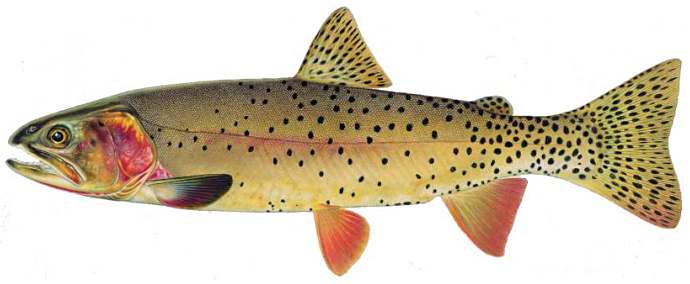ANDREW WYETH
DEAD AT 91
DEAD AT 91
Helga, Christina, Walt, Ben, Karl; immortalized
egg yolks immortalized too

 .. He was plagued with "wrong-time-ism." A bit of representation in a world of abstraction.
.. He was plagued with "wrong-time-ism." A bit of representation in a world of abstraction.  This made him a target of critics and a hero to everyman and college rebels. How dare he paint what he saw? It now seems a grand joke! Blessings be upon his soul.
This made him a target of critics and a hero to everyman and college rebels. How dare he paint what he saw? It now seems a grand joke! Blessings be upon his soul... Maybe it's always dreary in New England, maybe not, but Wyeth captured the light of the best fishing days.
.. The bugs know this, the fish know this, the neighbours know this; only the people who make calendars and illustrate fishing books ignore this.
 .. It's a simple equation: dreary day=fishy day. We mentioned this just last October and summoned "Christina's World" to illustrate the point.
.. It's a simple equation: dreary day=fishy day. We mentioned this just last October and summoned "Christina's World" to illustrate the point... We remember Andy, Helga, Walt, Ben, Karl, and the paintings that capture the light.
.. Be it a bedroom, a coot hunter, or a lobsterman's dory the signature style is distinctive - even the critics admit it. The mature style developed right after his father's death and was persistent over 50 years.
.. The New York Times, Los Angeles Times, and Smithsonian Magazine have notes about his passing. Less eloquent but more fun is a piece about his granddaughter's insights in The Seattle Times
 a couple of year's back.
a couple of year's back... We're not nearly so eloquent or impassioned, however, Wyeth's pictures are a delight: need we say it - speak for themselves.
 .. If you happen to be a Wyeth aficionado the subjects become intimate friends, protagonists, neighbours, and characters. The places become as familiar as your own kitchen. You can become fascinated with the ordinary.
.. If you happen to be a Wyeth aficionado the subjects become intimate friends, protagonists, neighbours, and characters. The places become as familiar as your own kitchen. You can become fascinated with the ordinary... Helga fascinated us, along with the rest of the country, in the 80's. Did painters still paint nudes? Did they do it in secret? What went on? Prurient interests fueled a
 sort of Helga mania. The critics loved it. Scholars doted on it.
sort of Helga mania. The critics loved it. Scholars doted on it... The neighbours winked and acknowledged that painters were people too. It was fun. We caught fish and called them Helga.
.. We are still in a world that loves the abstract. The best fishing place, the best fly, the best fighting fish, the most spectacular venue, the most exotic trip, the finest wine, the rod with best action, are all abstractions employed to enhance a fictive experience of the mind.
.. Wyeth celebrated the mundane. He reminded us of
 the day-to-day world. No escapism, no meaning in blotches and swirls, no denial of what was just next door and around the corner: just the mundane - Hallelujah!
the day-to-day world. No escapism, no meaning in blotches and swirls, no denial of what was just next door and around the corner: just the mundane - Hallelujah!.. The top of a chest, the landscape outside the window, the house next door, a neighbour, an old car, a baker and caregiver, all are available to the rest of us. No "BEST" just the rest.
.. We can associate with this. Our fish are mundane, normal, accessible, and next door. Our tackle is pedestrian and utilitarian, some of it older than we are: it works. It's familiar and friendly and has seen many days when a calendar photographer would stay home.
 .. We don't idolize our gear, we see no exaltation in a pleasurable pastime, and we acknowledge that our sport represents a pleasant and rather mundane bit of the universe. But we enjoy it.
.. We don't idolize our gear, we see no exaltation in a pleasurable pastime, and we acknowledge that our sport represents a pleasant and rather mundane bit of the universe. But we enjoy it... The spirituality of the mundane is too often overlooked. The vibrancy of the neighbourhood is reduced to oblivion by the
 promise of adventure, in exotic and unvisited places. We always seem to forget that there's no place like home.
promise of adventure, in exotic and unvisited places. We always seem to forget that there's no place like home... The emotionalism, spiritualism, and abstractions evoked by some critics and Wyeth himself is cerebral.
.. It's a meaning of the moment, and requires more than the
 viewing of the images. It requires that you know about Christina or Helga, or Walt. It requires that the viewer enter the neighbourhood and become familiar with Wyeth's home.
viewing of the images. It requires that you know about Christina or Helga, or Walt. It requires that the viewer enter the neighbourhood and become familiar with Wyeth's home... It requires that you evoke the time and place that is . . . Here & Now. A snapshot is just that, and Wyeth's are evocative. A history is written in a home; yours, ours, and his.
.. Wyeth enjoyed his home. He enjoyed his neighbours and neighbourhood and let us see it - warts and all.







.jpg)




